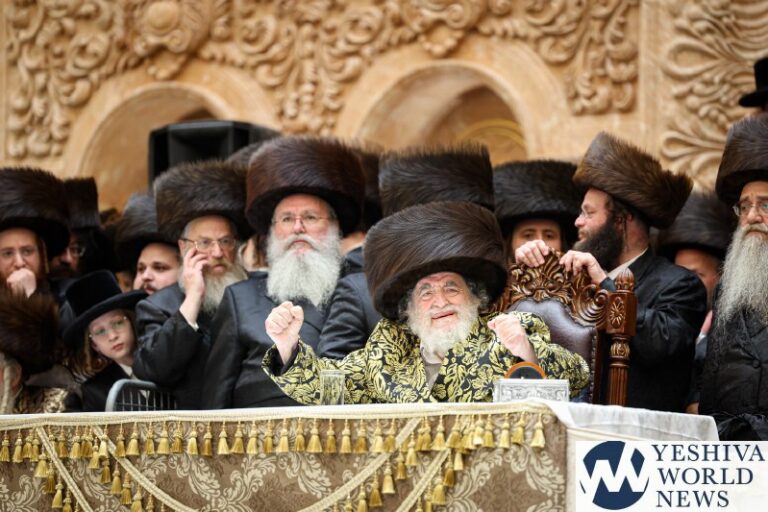Agudath Israel of America, along with seven other national Jewish organizations, filed an amicus curiae brief on Thursday asking the Sixth Circuit Court of Appeals to rehear a case with significant ramifications for religious freedom. The case, Marvin Gerber and Miriam Brysk v. Herskovits, et al., involves the rights to worship and free speech, and nearly two decades of protests and harassment affecting members of a synagogue in Ann Arbor, Michigan.
Two members of the Beth Israel Congregation synagogue brought the case against a group of people who have been appearing every Shabbos morning since 2003 in front of the synagogue and harassing its members by protesting and carrying signs with anti-Jewish slogans. The case was also brought against the city of Ann Arbor and various officials of the city for allowing the protests to continue. The protestors use signs with slogans such as “Resist Jewish Power,” “Jewish Power Corrupts,” and “No More Holocaust Movies.” One of the members bringing the case is a Holocaust survivor who has suffered extreme emotional distress from the ongoing protests which prevents him, at times, from attending synagogue services.
The Beth Israel members first turned to the City of Ann Arbor to take action against the protestors, asking the city to enforce its law requiring such protests to obtain a permit—which these protestors have not done. But the City refused to take action, claiming that the protestors have the right to freedom of speech, even though the protests are intimidating and harassing those attending synagogue services. The plaintiffs then filed a lawsuit in federal district court seeking an order against the protests, which the court denied and ruled that they had not demonstrated concrete injury. The Beth Israel congregants then appealed to the Sixth Circuit Court of Appeals where a panel of judges ruled that they had shown concrete injury, but that the protestors had free speech rights under the First Amendment and the protests were allowed to continue.
The synagogue members have submitted petitions to the Sixth Circuit Court of Appeals asking the court to rehear the case, and have requested that this time all judges on the Court take part in the hearing. The petitions argue that the protestors violated numerous laws and that the protests are not protected by the free speech clause of the First Amendment but rather constitute intimidation and harassment and interfere with their constitutional right to free exercise of their religion. As noted constitutional attorney Nathan Lewin wrote in his petition for plaintiff Marvin Gerber, the Court’s decision if left to stand could lead to more protests against other houses of worship throughout the country.
Upon hearing of the case, Agudath Israel of America took the lead in the effort to submit a “friend of the court” brief in support of the plaintiffs’ petitions. Attorney Joshua Klarfeld of the law firm of Ulmer & Berne LLP volunteered to research and write the brief, with help from his colleague Mengxue Xie and a group of law students and a recent law school graduate who are members of Agudah’s law student network. The brief was prepared and circulated to other major Jewish organizations to sign on. Joining the brief were the National Jewish Commission on Law and Public Affairs, the Agudas HaRabbonim, the Coalition for Jewish Values, the Orthodox Jewish Chamber of Commerce, the Rabbinical Alliance of America, the Rabbinical Council of America, Torah Umesorah (the National Society of Hebrew Day Schools), and the Union of Orthodox Jewish Congregations of America.
The brief argues that the case involves attacks on private citizens’ rights to exercise their religion freely when faced with consistent and sustained vicious protests targeting them specifically – as private citizens and as Jews. The brief further argues that the protests do not constitute speech entitled to First Amendment protection, but instead the speech includes epithets that, throughout the history of the Jewish people – from ancient times through the present – has led to assaults, pogroms, and murder. The brief concludes that the Sixth Circuit opinion would set a dangerous precedent, marking open season on Americans attempting to exercise their First Amendment Free Exercise right to worship, without interference by protestors espousing epithets and non-protected fighting words, at houses of worship throughout the country. The brief urges the Court to accept the petitions to rehear the case, reverse its previous position allowing the protests, and remand the case to the district court for a hearing on the issues raised by the plaintiffs.
“We hope that the Sixth Circuit will agree to accept the petitions for rehearing and rule that this case should have a full hearing on all the issues,” stated Mordechai Biser, Special Counsel for Agudath Israel of America. “Allowing such protests to continue creates a dangerous precedent that could lead to additional protests and potential violence at houses of worship across the country.”
Agudath Israel thanks Joshua Klarfeld and his colleagues at Ulmer and Berne for researching and writing this important brief in this critical case on a pro bono basis, and the team of law students and a recent law school graduate that assisted them.












2 Responses
This will be a tough case to prevail in.
The case is absolute nonsense, a waste of money and effort, and only serves to portray Jews as the enemies of American freedom and the constitution.
The law is crystal clear without any room for doubt: There is no exception to the first amendment for “epithets”, or for “hurt feelings”. It is every person’s RIGHT to congregate on public property to express their opinion, no matter how hurtful others find it. As for “harassment” and “intimidation”, the same is true of any union picket, which the courts have said time and again may not be banned.
If the evil Phelps family has the right to demonstrate outside the funerals of US war dead, then kol shekein vekal vachomer these antisemites can do so outside a shul.
Even the limits on demonstrations outside abortion clinics, which stretch the first amendment to the absolute limit, allow them at a reasonable distance, which MUST be close enough for those using the clinic to hear and understand the demonstrators’ message. Any state law that would distance them further than that is batel umevutal, lo shorir velo kayom.